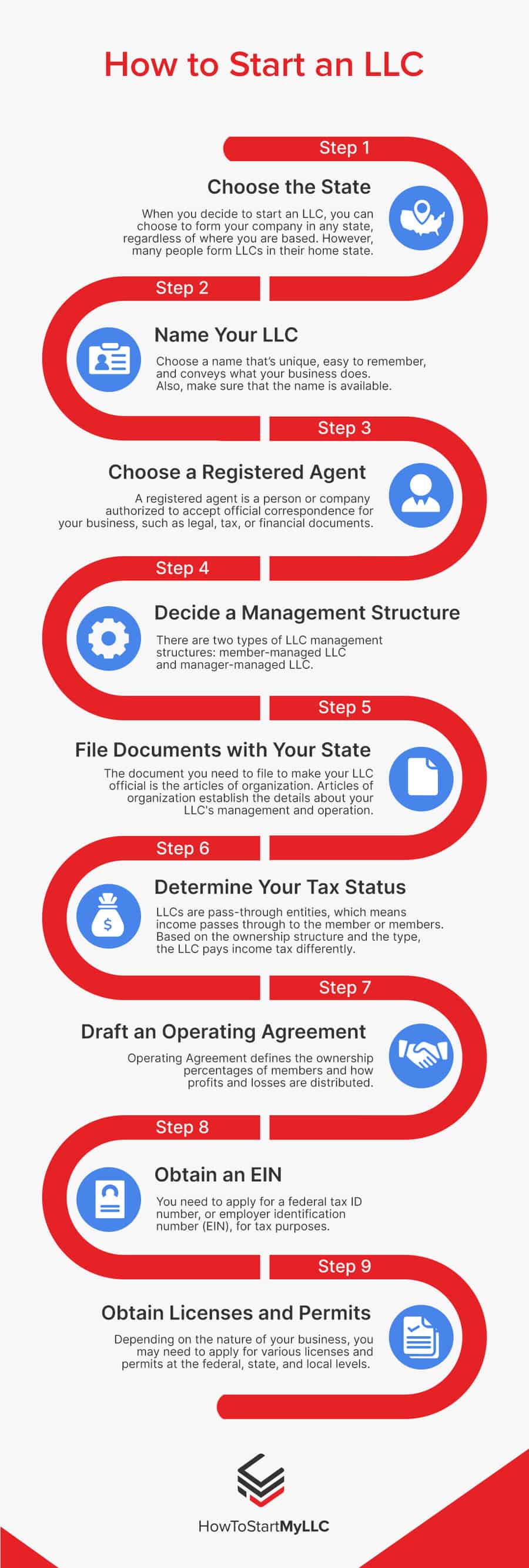When starting a new business, one of the first big decisions is which type of business entity to form. Many entrepreneurs choose a limited liability company (LLC) because of its many benefits. An LLC provides personal liability protection, for example, so that your assets are not at risk if your business is sued or cannot pay its debts.
Also, an LLC is a “pass-through entity” in taxes, meaning income passes through the company to the LLC owners or members, who report it on their tax returns.
LLCs also offer flexibility in management and tax status, yet another reason it’s a popular choice.
1. Choose a State
The first step is to choose the state in which you’ll form your LLC. Some states have very favorable legal rules and regulations when it comes to forming and running an LLC.
In most cases, your home state (i.e., the state in which you’re residing) will most likely be the best place to form your LLC.
Select your state below to find out step-by-step LLC formation guides.
2. Name Your LLC
Naming your LLC can be challenging. You want a name that’s unique, easy to remember, and conveys what your business does. You also want it to be SEO-friendly, so it can easily be found on Google. To find a good name, you could:
- Ask people you know for suggestions
- Use an online business name generator
- Brainstorm some ideas and ask family and friends for their opinion
Your business name is your business identity and the first impression people will have of your company, so be sure to take your time with this step and get it right.
Once you have a few business name ideas, you’ll want to ensure they’re available. So, first, do a business name search on your state’s relevant website, usually the Secretary of State’s website. Also, check your state’s LLC naming regulations to ensure you comply.
In most states, your LLC name must include the phrase “limited liability company” or one of its abbreviations (LLC or L.L.C.). It cannot have words that could confuse your LLC with any government agency. Your name cannot include words that refer to specific types of business – such as a bank, insurance, or university – without state approval.
Your business name must be distinguishable from all other business names in the state and cannot imply that you are a corporation or partnership.
Next, check with the US Patent and Trademark Office to ensure the name is not trademarked and is thus available nationally.
You should also check a site like GoDaddy to see if the domain name is available. For example, you’ll want a .com domain name rather than .org or .co to give your business more credibility.
Once you’ve confirmed these, it’s a good idea to reserve the name with the state using its name reservation form.
3. Select a Registered Agent
Most states require that you appoint a registered agent for your LLC. A registered agent is a person or company authorized to accept official correspondence for your business, such as legal, tax, or financial documents.
A registered agent ensures your business stays in compliance with state laws. The registered agent’s job is to provide no important notices or documents that are missed.
In most states, a member of the LLC can be the registered agent, or you can choose an individual that meets your state requirements. Generally, the requirements are that the registered agent:
- Be 18 years or older
- Have a physical address in the state – a PO box is not acceptable
- Be available during regular business hours
- If the agent is a business, it’s registered to operate in the state
Some states have more specific requirements, so check the rules in your state.
Many business owners hire a registered agent service to ensure all necessary documents are received and addressed promptly. A registered agent service also offers convenience.
If you choose to be your registered agent, you’ll have to be available at your registered agent’s address during regular business hours. However, a registered agent service will allow you the flexibility to run and grow your business wherever you need to be.
4. Determine Your Management Structure
Members or managers can manage LLCs. In a member-managed LLC, members handle all management duties. In a manager-managed LLC, non-member employees oversee operations and management duties.
Note that with a manager-managed LLC, a member can be a manager, but only in cooperation with another manager who is not a member.
Member-managed LLCs generally work best for LLCs with few members, all of whom can take an active role in day-to-day operations. Conversely, manager-managed LLCs are best for LLCs with multiple members, some of whom want to be “silent” or passive members and not involved in day-to-day operations.
Most LLCs are member-managed, as they are small businesses that cannot afford a management team.
Some states require that when you register your LLC with the state, you declare whether your LLC will be a member- or manager-managed, so be aware that you may need to make this decision before you file.
5. File Necessary Documents with Your State
In most states, the document you need to file to make your LLC official is the articles of organization. In some states, it’s called a certificate of organization or formation.
Generally, you can file the document online, usually on the Secretary of State’s website. The document requires your business name, address, registered agent information, and sometimes member or manager information.
Filing fees vary by state and range from $40 to $500. Depending on the state, your LLC should be approved within a few weeks of filing.
Some entrepreneurs use an LLC formation service to handle this step. It saves time and ensures the process is done correctly.
6. Determine Your Tax Status
As mentioned above, LLCs are pass-through entities, which means income passes through to the member or members. If the LLC has only one member, it’s taxed as a sole proprietorship. If the LLC has more than one member, it’s taxed as a partnership.
However, LLCs are unique because they can elect to be taxed as a corporation if the members decide it makes financial sense. This is done by filing an election form with the IRS. In addition, you can choose to be taxed as a C-Corp or an S-Corp.
C-Corp status means income is taxed at the current rate for corporations (21% as of Fall 2022), which is lower than the usual individual taxpayer rate. But keep in mind that C-Corp shareholders – who are members in the case of an LLC – must also pay taxes on their distributions. This is called double taxation.
However, members are subject to self-employment tax in an LLC that is taxed by default as a sole proprietorship or partnership. Once such LLC switches to being taxed as a corporation, self-employment taxes no longer apply.
Similarly, self-employment taxes do not apply to members with S-Corp status, which is the main advantage of electing S-Corp status.
With S-Corp status, members are generally paid as company employees, which means more accounting and payroll expenses. Therefore, S-Corp status is only beneficial when the self-employment tax savings are more significant than those additional expenses.
7. Draft an Operating Agreement
Most states do not require an operating agreement, but it’s a very important document. It defines the ownership percentages of members and how profits and losses are distributed. Those are the most important elements of the operating agreement, but it should also include the following:
- Each member’s rights and responsibilities
- Management structure and roles
- Voting rights of each member
- Rules for meetings and voting
- What happens when a member sells their interest, becomes disabled, or dies
You can find operating agreement templates here. The language of an operating agreement is crucial and can often help determine how member disputes will be resolved.
8. Get Your Employer Identification Number (EIN)
The IRS uses an EIN to identify your company. It’s used for tax filing purposes. An EIN is required if your LLC has more than one member or hiring employees. Obtaining an EIN requires applying on the IRS website.
The IRS rules for obtaining an EIN are as follows:
All EIN applications (mail, fax, electronic) must disclose the name and Taxpayer Identification Number (SSN, ITIN, or EIN) of the true principal officer, general partner, grantor, owner or trustor. This individual or entity, which the IRS will call the ‘responsible party,’ controls, manages, or directs the applicant entity and the disposition of its funds and assets. Unless the applicant is a government entity, the responsible party must be an individual (i.e., a natural person), not an entity.
9. Obtain Business Licenses and Permits
Depending on the nature of your business, you may need to apply for various licenses and permits at the federal, state, and local levels.
At the federal level, licenses and permits are generally industry-specific and may include health licenses and permits from the Occupational Safety and Health Administration (OSHA).
You may need a general business license to operate at the state level. If you sell tangible goods or services subject to sales tax, you’ll need a sales tax license, also known as a seller’s permit.
Check the SBA guide for specific licenses required for your business.
Here are some standard licenses and permits you may need:
- Industry-specific licenses for certain professions and industries, such as construction, plumbing, electrical, childcare, food handling, liquor, architecture, and finance
- Building and zoning permits
- Doing business as (DBA) permits using a name other than your LLC.
- Health licenses and permits at federal, state, and local levels
- Fire permits
- Sign permits
This is a crucial step in the LLC formation process, so make sure that you check with your state and local government offices to find out all the licenses and permits you need. You could face steep fines and penalties if you operate without the proper licenses and permits.
If you need help, it’s a good idea to consult a business attorney to ensure you’re in full compliance. You can also use a service like MyCorporation to do the research and provide you with all the forms you need to license your business.
Important Things to Do After Forming an LLC
1. Open Your Business Bank Account
When you have an LLC, it’s important to keep your business and personal finances separate for accounting and tax purposes. Co-mingling your business and personal funds can threaten your liability protection since the line between business and personal assets will not be clear.
Most banks offer business bank accounts, so check with your local bank. You’ll need your EIN and a copy of your articles of organization. Your bank may require other documents as well.
2. Apply for a Business Credit Card
A business credit card can help establish business credit so that if you apply for a business loan or line of credit in the future, you’ll have a better chance of getting approved. A business credit card can also help pay startup expenses, reducing out-of-pocket costs.
3. Get Business Insurance
Insurance is the right choice to protect the investment you’ve made in your business. There are several different types of insurance you may need.
- General liability: A comprehensive type of insurance covering many business elements. It includes coverage against bodily injury and property damage.
- Professional liability: Protects against claims from a customer who suffered a loss due to an error or omission in your work. It’s also known as errors and omissions (E&O) insurance.
- Workers’ compensation: Provides compensation to employees injured on the job.
- Property: Covers your physical business space.
- Business Property: Covers equipment and supplies.
- Equipment Breakdown Insurance: Covers the repair or replacement of broken equipment due to mechanical issues.
- Commercial auto: Covers your company-owned vehicles.
- Business owner’s policy (BOP): This option combines the above insurance types.
4. Keep LLC Records
You’ll want to keep copies of your formation documents and operating agreement in a safe place. Any other official documents, such as vendor contracts and legal or financial documents, should also be kept in your records.
5. Annual Reporting
Most states require that you file an annual or biennial report with the state to verify you’re still doing business. These can generally be filed online. A small fee usually applies and varies by state.
How much does it cost to start an LLC?
Starting an LLC involves several costs that can vary significantly depending on the state and specific business requirements. Here’s a detailed breakdown:
State Filing Fees
The primary cost of forming an LLC is the state filing fee, which ranges from $40 to $500. This fee is paid when you submit your Articles of Organization to the state.
Business Licenses and Permits
In addition to the filing fee, you may need various business licenses and permits to legally operate your LLC. The costs for these can vary widely depending on the industry, location, and type of business. For example:
- Local Business License: Fees typically range from $50 to $100 annually.
- State Licenses: Some states require specific licenses for certain types of businesses, which can cost anywhere from $20 to several hundred dollars.
- Federal Licenses: Certain industries, like aviation or broadcasting, may require federal licenses that can cost several hundred dollars.
Additional Costs
Other potential costs to consider when starting an LLC include:
- Name Reservation Fee: Some states allow you to reserve your desired business name before filing your LLC paperwork. This typically costs between $10 and $50.
- Publication Fees: A few states require new LLCs to publish a notice of formation in a local newspaper. This can cost anywhere from $40 to $200, depending on the publication and state requirements.
- Registered Agent Fees: While you can act as your own registered agent, many businesses choose to hire a professional registered agent service, which can cost between $50 and $300 per year.
- Operating Agreement: While not always legally required, an operating agreement is highly recommended. Legal fees for drafting this document can range from $100 to $1,000, depending on complexity and attorney fees.
- Annual Report Fees: Some states require LLCs to file annual reports, with fees ranging from $20 to $300.
Professional Assistance
If you choose to use an attorney or an LLC formation service to handle the paperwork and ensure compliance, this will add to your costs. Professional services can range from $100 to $1,000 or more, depending on the complexity of the formation process and the level of service provided.
How Long Does It Take to Form an LLC?
Filing the LLC formation paperwork with your state should take less than an hour. State approval times vary but usually take up to a few weeks. In some states, your LLC will be formed as soon as you file your paperwork.
Still, you’ll have work to do before and after your paperwork is filed. But either way, you should be able to get your LLC up and running pretty quickly.
Make sure you complete the entire process to comply with all regulations. It’s best to have an attorney or professional service involved, as they can ensure that all your documents, particularly the operating agreement, are properly drafted.
Do I Need an LLC to Start a Business?
Forming an LLC provides benefits such as limited liability protection, which shields your personal assets from business liabilities, and potential tax advantages through pass-through taxation.
However, other business structures like sole proprietorships, partnerships, and corporations are also viable options depending on your needs.
Sole proprietorships and partnerships are easier and cheaper to establish but lack liability protection.
Corporations offer more complex structures and potential tax benefits but require more extensive record-keeping and regulatory compliance.
Your choice should align with your business goals, risk tolerance, and desired level of operational complexity.
How Do I Know if My LLC Has Been Approved?
If you’re forming a limited liability company (LLC), you’ll need to file articles of organization, sometimes called a certificate of organization or certificate of formation, with your state. In some states, your LLC will be formed immediately if you file online; in others, it can take a few weeks.
You should receive a notice of your LLC’s approval either by mail or email. But if you don’t, or you think you might have missed it, you can quickly check the status of LLC formation by doing a business name search on the state website.
If your business name appears, your LLC is formed and ready to go. But you should know that forming your LLC with the state is just one of several key steps in the LLC formation process.
How Long Does an LLC Last?
An LLC does not have a predefined expiration date and can theoretically last indefinitely. The duration of an LLC is generally determined by the state laws where the LLC is formed and the specific terms outlined in the LLC’s Articles of Organization or Operating Agreement.
Here are some key points regarding the duration of an LLC:
- Perpetual Existence: Most states allow LLCs to have perpetual existence, meaning they can continue operating indefinitely until the members decide to dissolve the company.
- Defined Duration: In some cases, the members of the LLC may choose to set a specific duration for the LLC in the Articles of Organization. This is less common but can be done if the members have a particular time frame in mind for their business activities.
- Events Leading to Dissolution: Certain events, such as the death or withdrawal of a member, bankruptcy, or court orders, can lead to the dissolution of an LLC, unless the Operating Agreement specifies otherwise.
- Voluntary Dissolution: Members of the LLC can decide to dissolve the company voluntarily. This process typically involves filing dissolution documents with the state and settling the LLC’s debts and obligations.















